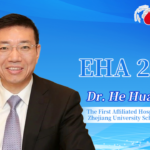
Editor's Note: Mantle cell lymphoma (MCL) is an aggressive lymphoma with high malignancy and poor treatment outcomes, especially for elderly patients or those in poor health. Optimizing treatment regimens for these patient groups is crucial. At the recent 29th European Hematology Association (EHA) annual meeting, Dr. Michael Wang from University of Texas MD Anderson, Houston, USA presented the latest results from the phase 3, double-blind, placebo-controlled ECHO trial (LB3439), which evaluated the efficacy of acalabrutinib combined with bendamustine and rituximab in treatment-naïve MCL patients. "Oncology Frontier - Hematology Frontier" interviewed Professor Wang to interpret these groundbreaking findings.Dr. Michael Wang: Hello, everyone. I am Michael Wang, originally from Weifang, Shandong. It is a great pleasure to reunite and share insights into the ECHO clinical trial.
At the Late Breaking session of the EHA plenary, I had the honor of presenting the latest findings from the ECHO trial. For young treatment-naïve MCL patients in the US, we typically use intensive therapies such as autologous transplantation or the Hyper-CVAD regimen, which can achieve over ten years of OS. However, these intense therapies are often too harsh for elderly MCL patients or those in poor health. For these patients, R-CHOP is used in China, while BR (bendamustine + rituximab) is most common in Western countries.
To improve treatment outcomes for these patients, we have continually explored and optimized treatment regimens. Our first attempt was combining BR with the first-generation BTK inhibitor ibrutinib, known as the SHINE study. However, despite showing significant differences in PFS over ten years, the SHINE study did not show an OS improvement, leading to the FDA withdrawing this therapy from the US market.
Against this backdrop, we explored another possibility: combining BR with the second-generation covalent BTK inhibitor acalabrutinib, the core of the ECHO study. This randomized, double-blind, placebo-controlled trial spanned 150 hospitals across 26 countries and demonstrated that the ABR group significantly outperformed the placebo + BR group in PFS. Specifically, PFS in the acalabrutinib group reached 66 months compared to 50 months in the placebo group, a statistically significant difference.
Although OS has not yet reached statistical significance, the survival curves of the acalabrutinib and placebo groups in the ECHO study have distinctly separated, which is crucial for FDA approval. In contrast, the survival curves in the SHINE study almost overlapped, lacking a clear trend, which was a key reason for its non-approval by the FDA.
Therefore, I believe the ECHO trial is a positive study with the potential to become a new standard of care, likely to be approved first in the US, followed by Europe and other countries using the BR regimen. I hope Chinese patients can also access the BR regimen soon, as it is significantly more effective than R-CHOP. When combined with acalabrutinib, it offers an even better treatment option.
Some may question, “Why advocate for chemo-free treatment yet still use a chemo-containing BR regimen in the ECHO study?” I believe each trial has specific research purposes and limitations. Chemo-free treatment is undoubtedly the future trend, but its data is still immature and has not gained wide acceptance. Therefore, at the current stage, the combination of BR with acalabrutinib is a highly recommended treatment option.
Michael Wang
- Professor, Department of Lymphoma & Myeloma, MD Anderson Cancer Center
- Director, Cancer Research Center, Norwalk, Connecticut
- Fellow, Oncology and Hematology, MD Anderson Cancer Center
- Director, Mantle Cell Lymphoma (MCL) Excellence Program, Co-Director of Clinical Trials, MD Anderson Cancer Center
- Developed the first MCL animal model for studying MCL biology and treatment – MCL-SCID-hu mouse model
- Principal Investigator of international multi-center registrational trials for MCL
- Principal Investigator of the MD Anderson Cancer Center B-Cell Lymphoma Moon Shot Program


